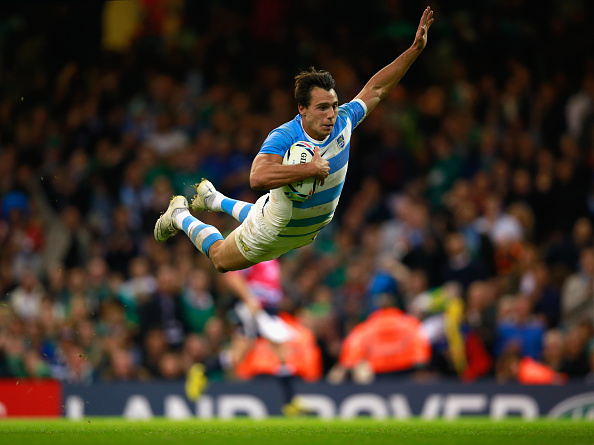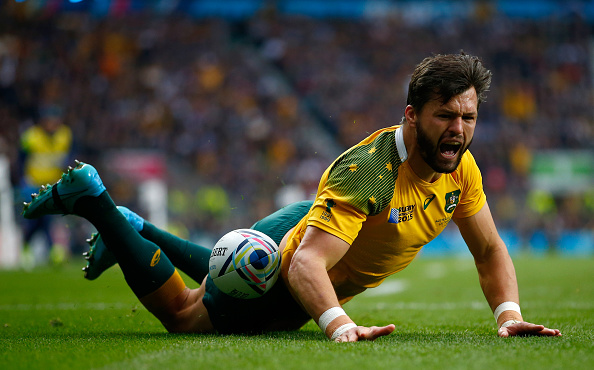One of the many extraordinary things about this Rugby World Cup has been the weather. Considering this is autumn in Britain, the tiny number of matches which have been played in the rain is unbelievable and the dry conditions have helped teams deliver some breathtaking tries.
The forecast is dry again for this Sunday, when Argentina and Australia meet in their World Cup semi-final at Twickenham. Let’s hope it stays that way, as both these teams are capable of producing a fantastic spectacle of running rugby if the elements are in their favour.
Argentina have made more metres in attack at this World Cup than any other team. Their total of 3,227m from the first five matches surpasses even New Zealand on 3,077 and works out at an astonishing average of 655.4 per match. The Pumas have scored 26 tries, at an average of just over five per match, and only the All Blacks are ahead of them there, with 34 tries so far.
Australia lag behind in these stats a little, with 22 tries (4.4 per match) and 2,021 metres made, but their average of 35 points per match is still none too shabby. If they and Argentina keep producing this kind of return during their semi-final, we are in for some match.
As Argentina wing Juan Imhoff says: “We love to attack. There is less pressure and less money in the south. People there have nothing to lose. In the north, the most important thing is to win. In the south, the most important thing is to entertain, to create a beautiful game.”
Wings take flight
Down the years, Argentine rugby has been famed more for its forward power than its scintillating back play, but at this tournament the main headline-grabbers in the Pumas’ ranks have been fly-half Nicolas Sanchez, and the two wings, Imhoff and Santiago Cordero.
Imhoff is joint second in the tournament’s list of try-scorers, with five (Julian Savea has eight). He is also joint second in the table of clean breaks with ten, and as only England’s Anthony Watson is ahead of him on 11, Imhoff should overhaul that mark on Sunday.
The 27-year-old from Rosario has spent the last four seasons plying his trade with Racing Metro in Paris. He had 16 Test tries to his name before the start of this tournament, scored in 29 matches, including a hat-trick against South Africa in August, but it’s fair to say his five in the last five games have put Imhoff in the spotlight like never before.
His pace is electric, he chooses great running lines and will definitely have been a focus of attention in Australia’s video analysis this week.
A newer kid on the block, 21-year-old Cordero has just 16 caps and his only Test tries before this tournament had been a hat-trick against Paraguay in May. He made his international debut against England in November 2013, a month before his 20th birthday, and has been playing club rugby for Regatas de Bella Vista, in Buenos Aires. He will be a member of Argentina’s new Super Rugby team in 2016.
Cordero might not have expected to play a leading role at this World Cup, but injuries to Gonzalo Camacho and Montero Manuel gave him an opportunity and he made the most of it, scoring two tries against Georgia – including one from a swerving run from his own half – and another against Tonga. He didn’t cross the whitewash in the quarter-final win over Ireland, but Cordero’s chip sent Imhoff over for his second try.
Can the Wallabies tame the Pumas?
Can Australia’s wing nullify the threat offered by Imhoff and Santiago, or match them blow for blow? The partnership which took them to victory over Wales in their last pool game and Scotland in the quarter-final certainly has the experience to do so, as Adam Ashley-Cooper boasts 112 caps and Drew Mitchell has 68, and both have scored 34 Test tries.
The Wallabies started the tournament with Ashley-Cooper and Rob Horne on the wings, but after Horne injured his shoulder in the win over England, Mitchell stepped in and reminded everyone of his worth, with two tries against Scotland to match his two against Uruguay. His tally of World Cup tries is now 14, just one behind the joint all-time leaders, Jonah Lomu and Bryan Habana.
The 31-year-old might not have expected to be at this World Cup, after leaving home soil to play for Toulon, but when Australia relaxed their “no overseas players” rule earlier this year, it opened the door for Mitchell to continue his Test career.
Ashley-Cooper has played plenty of Test rugby at full-back and centre, but he’s been on the wing throughout 2015 and is looking as sharp as ever. He might only have scored one try at this World Cup, but his vast experience will be invaluable to Australia as they attempt to reach their fourth Rugby World Cup final.
Will the Wallabies bound onwards, or will the Pumas have too much bite for them? It will be fun finding out.
Numbering up – the wings’ RWC 2015 stats
- Metres made – Cordero (four matches) 348m, Imhoff (five matches) 306m, Ashley-Cooper (four matches) 207m, Mitchell (three matches) 202m
- Carries over the gain line – Cordero 12, Imhoff 7, Ashley-Cooper 6, Mitchell 15
- Defenders beaten – Cordero 18, Imhoff 15, Ashley-Cooper 2, Mitchell 16
For all the latest Rugby World subscription offers, click here.









